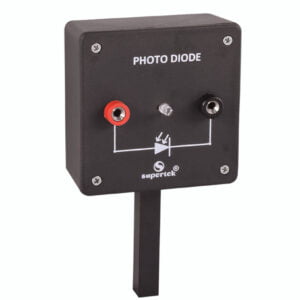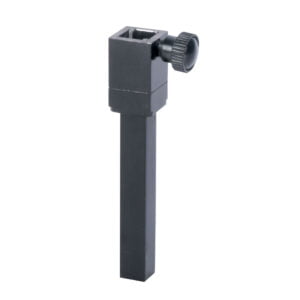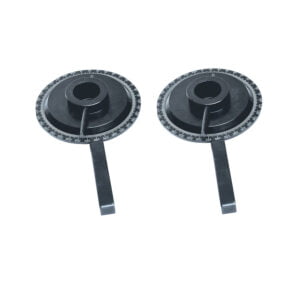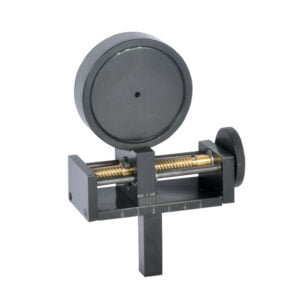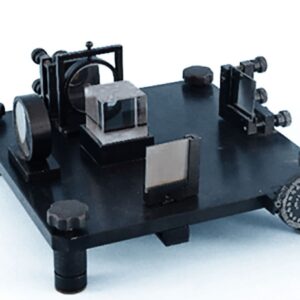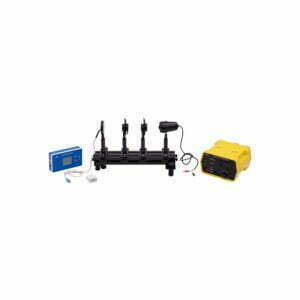Higher Science
-
-
Accessories
Quarter Wave Plate Holder
The holder is designed to hold a 22mm quarter-wave plate. A waveplate is an optical device that alters the polarization state of a light wave traveling through it. The quarter-wave changes the phase difference between the two components of polarized light traversing it by one-fourth cycle.
HA030 -
Accessories
Half Wave Plate Holder
The holder is designed to hold a 22mm half-wave plate. A waveplate is an optical device that alters the polarization state of a light wave traveling through it. Half-wave plate, reduces by ¹/₂ cycle, the phase difference between the two components of polarized light traversing it.
HA031 -
Accessories
Light Sensor Holder
Light sensor module for use with rotating table assembly (UP030). The light sensor when used with Data Processor measures light intensity at various angles of reflection and gives a continuous smooth curve of angle vs light intensity. The meter reads with a precision of 1 lux.
HA511 -
Accessories
Travelling Light Sensor Holder
Travelling Light Sensor Holder, mounted on the square rod, can be held upright on the optical bench. When used with Data Processor (DP1), this holder measures the light intensity of various orders (like 1st, 2nd, and so on) of the interference patterns formed by diffusing light by any obstacle or opening.
Specifications
Least count – 1 LuxHA512 -
Higher Science
Interferometer Experiment
Objectives
- To produce and observe the interference pattern.
- To measure the wavelength of laser source using the interferometer.
Principle
Phenomena of interference can be explained by the principle of superposition. Consider two E.M waves simultaneously propagating through the same region of space. The resultant electric field at any point in that region of space is the vector sum of the electric field of each wave. Depending on the strength of the resulting electric field at a point in space where the two waves superpose, we observe dark and bright regions in the interference pattern.
Key Features
- Easy to Setup – The apparatus is built on a sturdy and portable platform. The legs are height adjustable to aid leveling of the platform & precise optical alignment of the laser beam. All this reduces the time taken for setup and aids the ease of measurements.
- High quality beam splitter and reflective mirrors – The setup comes with 40 x 40 x 40mm beam splitter cube and 40 x 40mm (98% highly reflective) mirrors for clear fringe pattern.
- 1 micron step movement – The complex double lever mechanism enables a least count of 1 micron in movement of the fixed mirror. Measurement error is less than 5% in wavelength measurement.
INT1-C -
Experiments
Malus Law Experiment
OBJECTIVES
- To experimentally verify malus’s law.
PRINCIPLE
Light, when modeled as a wave phenomenon, can be classified as a transverse electromagnetic wave consisting of oscillating electric and magnetic fields that are oriented perpendicular to each other. Depending on the orientation of the plane of polarization of the electric field with respect to the direction of propagation of the wave, the wave can be classified as polarized or un-polarized. To measure the variation of transmission of an EM wave through two polarizers as a function of the angle of orientation between them and prove Malus’s Law.KEY FEATURES
- Precise Optical Alignment: The optical alignment of the components is attained by the optical bench, the set-up time is faster and experimentation is easy.
- Easy Analyzer Movement: The design of the analyzer helps for easier rotation without disturbing the optical alignment. The least count of 1° aid for more accurate readings.
- Digital Lux Meter: A digital lux meter enables the measurement of light intensity for each rotation of the analyzer. The least count of 1 Lux provides accurate readings.
WHAT YOU NEED
- OB2 Optical Bench Set 0.4m 1
- HA001 Light Source Holder 1
- HA004 Polarizer Holder 1
- HA006 Analyzer Holder 1
- HA510 Light Sensor Holder 1
- PH61022D/2 Power Supply for Light Source 1
- DP1 Data Processor 1
Complete Equipment Set with Instruction Manual from catalogue.
MLE1-C -
Experiments, Higher Science
Millikan Oil Drop Apparatus
Supertek’s Millikan Oil Drop Apparatus is a contemporary version of the classic design which allows the students to observe the velocity of an oil drop rising and falling in an electric filed. The apparatus is equipped with camera which allows the user to connect it with the computer screen for an easy viewing of the droplets. It permits the calculation of the force acting on the charge carried by the oil drop.
What’s Included
1x Millikan Oil Drop Apparatus
1x Non-Volatile Oil
1x Multimeter
1x StopwatchExperiments
To determine the charge of an electron by Millikan’s Oil Drop MethodMLK1-C








